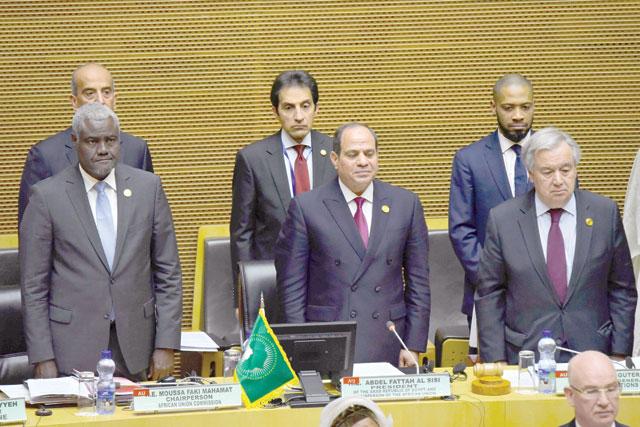You are here
Israel dispute erupts at African Union summit
By AFP - Feb 06,2022 - Last updated at Feb 06,2022

United Nations Secretary General Antonio Guterres addresses presidents and delegates via a telecast at the African Union (AU) headquarters during the 35th Ordinary Session of the AU summit in Addis Ababa, on Saturday (AFP photo)
ADDIS ABABA — Palestinian Prime Minister Mohammed Shtayyeh on Saturday urged the African Union (AU) to withdraw Israel's accreditation, bringing simmering tensions to a head as the 55-member bloc opened a two-day summit in Addis Ababa.
Even as the continent reels from a spate of military coups and the coronavirus pandemic, the relationship with Israel is expected to figure prominently during the summit this weekend.
The dispute was set in motion last July when Moussa Faki Mahamat, chair of the African Union Commission, accepted Israel's accreditation to the bloc, triggering a rare dispute within a body that values consensus.
As heads of state gathered in Ethiopia's capital on Saturday, Shtayyeh called on the body to reject Faki's move.
"Israel should never be rewarded for its violation and for the apartheid regime it does impose on the Palestinian people," he said.
"Your excellencies, I'm sorry to report to you that the situation of the Palestinian people has only grown more precarious."
The summit may see a vote on whether to back or reject Faki's decision, which could yield an unprecedented split in the bloc.
Israel's accreditation last year drew quick protest from powerful members, including South Africa and Algeria which argued that it flew in the face of AU statements supporting the Palestinian Territories.
Earlier Saturday Faki said the AU's commitment to the Palestinian push for independence was "unchanging and can only continue to go stronger".
He defended Israel's accreditation, however, saying it could be "an instrument in the service of peace" while calling for "a serene debate" on the issue.
War in Ethiopia
This year's summit comes as the AU faces mounting pressure to push for a ceasefire in host country Ethiopia, where a 15-month war has killed thousands of people and, the UN says, driven hundreds of thousands to the brink of starvation.
The conflict pits Prime Minister Abiy Ahmed’s government against fighters from the northern Tigray region.
It has precipitated a rapid deterioration in ties between Abiy, the 2019 Nobel Peace Prize winner, and Western powers who once saw him as a reformer but have condemned alleged massacres and mass rape committed during the conflict by Ethiopian and allied forces.
The fact that Ethiopia hosts the AU has made any intervention by the bloc especially delicate, and Faki waited until last August — nine months after fighting began — to appoint Nigeria’s former president Olusegun Obasanjo as a special envoy tasked with trying to broker a ceasefire.
On Saturday, Abiy praised his fellow African leaders for what he described as their “support”.
“Ethiopia’s challenge was internal in nature and a matter of maintaining law and order. But the solution of our internal matters was made exceedingly difficult by the role played by external actors,” Abiy said.
“I wish to take this opportunity to thank you all for your support, solidarity and understanding as we underwent these trying times.”
Abiy also proposed the creation of “an African Union continental media house”, renewing his criticism of international media coverage of Ethiopia and the continent at large.
“Negative media representation of Africa not only disinforms the rest of the world about our continent, but also shapes the way we see ourselves as Africans,” he said.
Coup ‘resurgence’
African leaders are also preoccupied with a recent string of military coups.
Four member states have been suspended by the AU’s Peace and Security Council since mid-2021 because of unconstitutional changes of government — most recently Burkina Faso, where soldiers ousted President Roch Marc Christian Kabore last month.
Addressing African foreign ministers this week, Faki denounced a “worrying resurgence” of such putsches.
But the AU has been accused of an inconsistent response, notably by not suspending Chad after a military council took over following the death of longtime President Idriss Deby Itno on the battlefield last April.
Attendees will also discuss the coronavirus pandemic, with South African President Cyril Ramaphosa, who is participating in the summit virtually, expected to provide an update on Africa’s response to COVID-19, nearly two years after the continent’s first case was detected in Egypt.
As of January 26, only 11 per cent of Africa’s more than one billion people had been fully vaccinated, according to the Africa Centres for Disease Control and Prevention.
Related Articles
ADDIS ABABA — African leaders on Sunday condemned US President Donald Trump's Mideast peace plan as illegitimate, taking advantage of an Afr
ADDIS ABABA — European Commission President Ursula von der Leyen assured Africa of the EU’s strong support during a visit to Ethiopia on Sat
ENTEBBE, Uganda — Israeli Prime Minister Benjamin Netanyahu arrived in Uganda on Monday for a rare tour of sub-Saharan Africa, seeking new t














